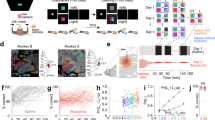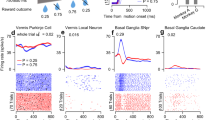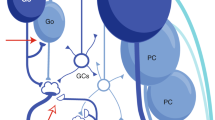Abstract
THE neurones of the cerebellum are arranged in an extremely regular fashion and their synaptic connections are known in detail1; this has led to considerable speculation about the functioning of these neuronal circuits. In particular, following a proposal that the cerebellum is involved in the learning of movements2, there have been a number of theories about how the cerebellar circuitry could be used in this way3–5. These theories are all based on the postulate that the signals relating to motor output which are to be stored in the cerebellum have been computed in the cerebral cortex, and transmitted from there to the cerebellum for storage. They assume that the initial learning process, during which the animal learns to produce motor outputs with favourable consequences for itself, takes place somewhere in the cerebral cortex and not in the cerebellum: only after the cerebral cortex has learned how to generate these motor outputs is the information for their production stored in the cerebellum. Recent results suggest, however, that this postulate is incorrect, and that the cerebellum is directly involved in the learning of motor actions which have satisfactory consequences for the animal. To account for these results I describe a new way by which the cerebellum could be used for storing information relating to movements.
This is a preview of subscription content, access via your institution
Access options
Subscribe to this journal
Receive 51 print issues and online access
$199.00 per year
only $3.90 per issue
Buy this article
- Purchase on Springer Link
- Instant access to full article PDF
Prices may be subject to local taxes which are calculated during checkout
Similar content being viewed by others
References
Eccles, J. C., Ito, M., and Szenthágothai, J., The cerebellum as a neuronal machine (Springer, New York, 1967).
Brindley, G. S., Int. Brain Res. Org. Bull., 3, 80 (1964).
Marr, D., J. Physiol., Lond., 202, 437–470 (1969).
Albus, J. S., Math. Biosci., 10, 25–61 (1971).
Gilbert, P. F. C., Brain Res., 70, 1–18 (1974).
Olson, L., and Fuxe, K., Brain Res., 28, 165–171 (1971).
Siggins, G. R., Hoffer, B. J., Oliver, A. P., and Bloom, F. E., Nature, 233, 481–483 (1971).
Crow, T. J., Spear, P. J., and Arbuthnott, G. W., Brain Res., 36, 275–287 (1972).
Williams, M., and Rodnight, R., Brain Res., 77, 502–506 (1974).
Crow, T. J., Nature, 219, 736–737 (1968).
Thach, W. T., J. Neurophysiol., 33, 527–536 (1970).
Mano, N., Brain Res., 70, 381–393 (1974).
Anlezark, G. M., Crow, T. J., and Greenway, A. P., Science, 181, 682–684 (1973).
Mason, S. T., and Iversen, S. D., Nature, 248, 697–698 (1974).
Loizou, L. A., Brain Res., 15, 563–566 (1969).
Eccles, J. C., J. Physiol., Lond., 229, 1–32 (1973).
Author information
Authors and Affiliations
Rights and permissions
About this article
Cite this article
GILBERT, P. How the cerebellum could memorise movements. Nature 254, 688–689 (1975). https://doi.org/10.1038/254688a0
Received:
Revised:
Issue Date:
DOI: https://doi.org/10.1038/254688a0
This article is cited by
-
Injections of β-noradrenergic substances in the flocculus of rabbits affect adaptation of the VOR gain
Experimental Brain Research (1990)
Comments
By submitting a comment you agree to abide by our Terms and Community Guidelines. If you find something abusive or that does not comply with our terms or guidelines please flag it as inappropriate.



